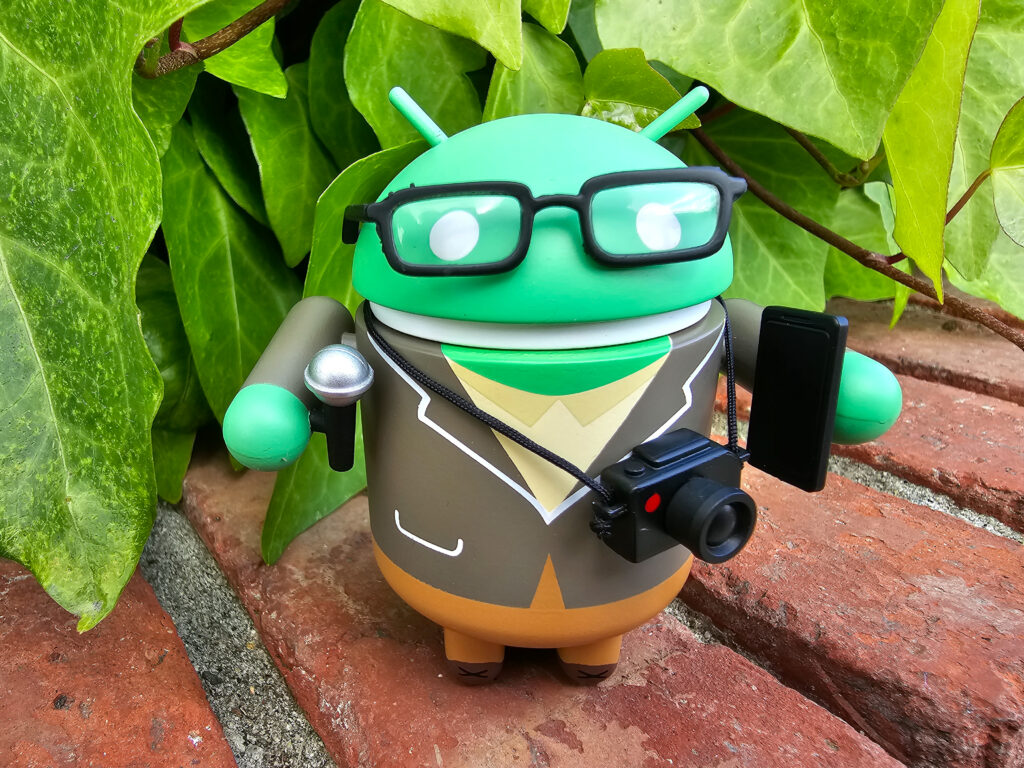Since June 6, 2023, I have made several concerted efforts to write this post. Each time, I ran aground. This instance is no exception, because I cannot conceptualize what needs to be stated. So, simply: Journalism is dead. News reporting as I once knew it is no more. Reporters don’t properly source. They editorialize and subjectify the news. Advocacy replaces objectivity.
That’s what makes the Reporter / Journalist / Correspondent @Work Android Collectible iconic. He marches along carrying his smartphone, microphone, and Leica rangefinder (see the red dot on the camera). He is intrepid and valiant. He seeks the truth, and knows that it demands trudging out into the field and documenting events and speaking to real people. He doesn’t mine Google, Instagram, Reddit, or any other online resources.
He instead does what I said that all news gatherers should in my March 2010 missive “The Difference Between Blogging and Journalism“:
A good journalist does original reporting, starting with seeking out additional or even independent sources. The objective is two-fold: Accuracy and objectivity…Good journalists are mindful of their sourcing, particularly those sources who aren’t identified…Using a single source is often careless. Referring to another blog or news source as single source is reckless. Reporting news based on a single, anonymous source is negligence.
Being so despondent by the sordid state of my profession, I can’t write much more than refer to some of my past posts about good journalism:
- “News Writing Triage“
- “When the Crowd Roars“
- “Journalist’s Trust Is Inviolate“
- “Responsible Journalism Cheat Sheet“
- “Six Films Every Journalist Should See“
- “The Four Bad Habits of News Sourcing“
- “You Live in the Present, Write That Way“
- “News Gatherers, Don’t Violate the ‘Prime Directive’“
Quick advice for anyone wanting to responsibly report:
1. Ask first about everything: “Who benefits?” The question is a great filter for putting news in proper context, ferrying out manipulation or misinformation, and for discerning the motives of sources.
2. Write what you know to be true. With qualifier: In the moment. Particularly for breaking news stories, what is believed to be true will change as more information becomes available.
3. Primarily use first-hand sources. If you don’t speak to—or otherwise communicate with—the source(s), you don’t know what is true.
4. Follow the reporting. Let the news gathering lead you. Start with a hypothesis and then see where it goes; often that will be somewhere other than expected. If your objective is to mold the reporting to prove the story you set out to tell, write a novel. You aren’t a journalist.
5. Produce original content. Don’t be an imitator. Be original and provocative. It’s a sure way to build audience, establish trust, and fashion a credible body of work.
6. Distrust everything on the Internet. Now that artificial intelligence and other tools make fakery easy, you cannot assume anything available online is credible. Then there is the vast amount of overall misinformation and quackery spilling across social media and even from traditional news organizations. If you ask “Who benefits?” and independently source, you can avoid being caught in the World Wide Web of Lies.
7. Correct the record. If a story is no longer accurate, because facts changed or new ones emerged, update the story and write another. If you were mistaken, admit it, issue a correction, and write a follow-up story. Because content lingers on the Internet and can spread misinformation over time through search and social sharing, correcting the record is a moral imperative.
I used Samsung Galaxy S23 Ultra to shoot the Featured Image. Vitals: f/2.2, ISO 50, 1/240 sec, 13mm (film equivalent); 5:39 p.m. PDT.
